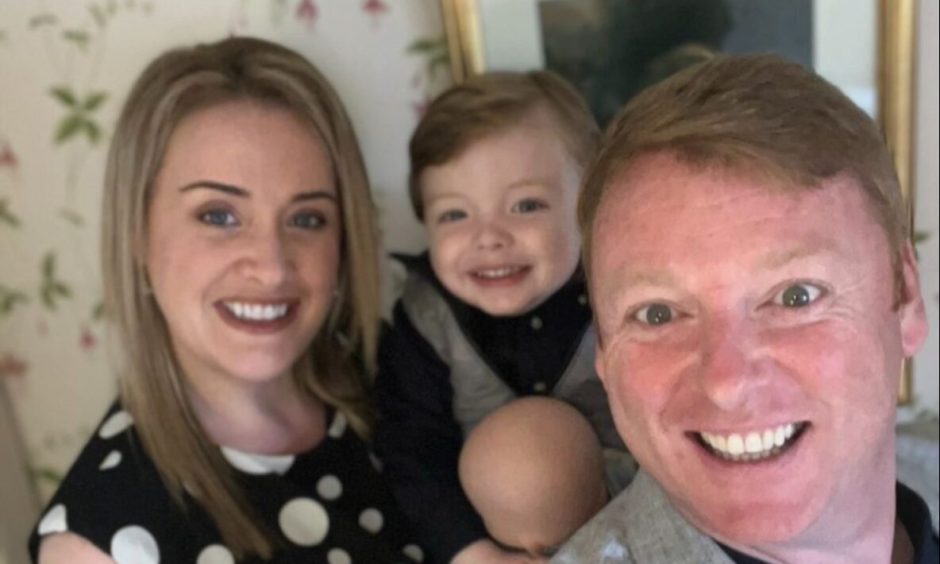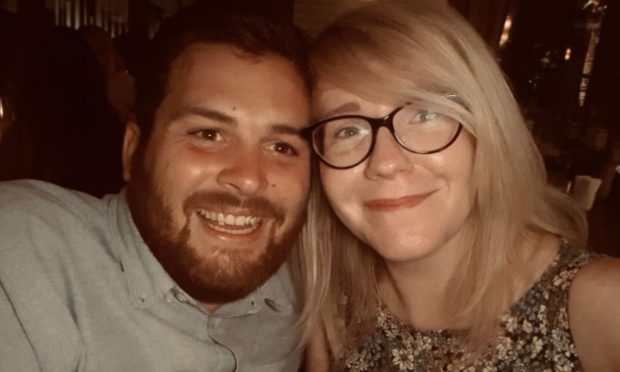
A mum who became dangerously ill while pregnant and lost her baby son is calling for greater care for expectant mothers – as it emerged a new life-saving test announced last year is still not being offered.
Lisa Watson suffered from pre-eclampsia – a dangerous condition which raises pregnant women’s blood pressure, putting them at risk of seizures and organ damage – while expecting her son Angus.
She was never given a vital Placental Growth Factor (PlGF) test, which would have revealed her condition, despite it having been approved for use in Scotland five months earlier.
Angus was born at just 24 weeks, and lived for seven days, while Lisa suffered seizures.
The Scottish Health Technologies Group (SHTC) approved the Placental Growth Factor test in March 2023, after months of campaigning by the Sunday Post.
But a series of freedom of information requests to Scotland’s health boards by the charity Action on Pre-Eclampsia (APEC)has discovered that no health board is currently offering the test.
When approached by The Sunday Post, the Scottish Government admitted health boards were struggling to introduce the tests due to a lack of testing capacity and problems with infrastructure.
The charity said: “One year on since the Scottish Health Technologies Group recommended the use of PlGF-based pre-eclampsia tests no health board has been able to implement it because of a lack of funding and support. PlGF-based testing for pre-eclampsia has been used in the NHS in England since 2016.”
Maternal deaths have risen in the UK in recent years, with pre-eclampsia a major reason, say leading doctors.
Between 5% and 10% of mothers are at risk of the dangerous condition.
Babies have to be delivered early to save the mother’s life, and are often too premature to survive.
Lisa’s story
Lisa, who works as a teacher in Abu Dhabi, had returned to Scotland to spend time with her family last July, a month before she became desperately ill.
She said: “Checks at my doctor’s clinic in Abu Dhabi said everything was fine and my 20-week scan was fine, so we travelled to the UK for the summer with our families.
“Fast forward to August 2023, I started to get some unusual heartburn at home in Scotland.
“My doctor here gave me heartburn medication but by the next evening the pain was so bad, my parents took me to A&E. After seven hours there I was transferred to the maternity ward and told I had HELLP Syndrome.”
Haemolysis, Elevated Liver enzymes and Low Platelets syndrome is a life-threatening pregnancy complication considered a variant of pre-eclampsia.
Lisa said: “My liver was seriously affected and blood pressure skyrocketing so I was blue-lighted to Wishaw Maternity which had a neonatal ICU (NICU) for seriously premature babies.”
Within 20 minutes of arrival, she suffered a seizure and her baby’s heart rate dropped. Her best chance of survival was to deliver the baby at just 24 weeks gestation.
“Our beautiful Angus Benjamin Rowley was born and needed resuscitated before being transferred to NICU. During my C-section the consultant found internal bleeding and surgeons were called to do an emergency laparotomy,” said Lisa.
“My liver had ruptured, and my life was in danger but thankfully, the surgeons were able to repair it and I was transferred to ICU for four days.”
Along a series of corridors another team of ICU doctors and nurses were working to save baby Angus.
In his seven days of life, he endured two brain bleeds and tragically declined because he was too young to survive.
Lisa said: “We got to see him in those very precious last few days.
“He loved it when we held his hand and would require less oxygen during these times, but his lungs were not developed enough to survive. We were lucky to have all his grandparents with us then to spend time with Angus and tell him stories.
“My husband and I were able to hold him on the morning of his last day on Earth and we will forever treasure those moments. Losing your baby and almost your life from pre-eclampsia is incredibly painful and we never want it to happen to any other mother and baby. Any symptom should spark a PlGF test.”
Despite it running in families few women are asked if their mothers or grandmothers had it. “My mother had suffered from pre-eclampsia and I was never asked,” Lisa added.
‘Action is long overdue’
Marcus Green, chief executive of APEC said: “It’s now a year since the Scottish Health Technologies Group recommended the use of PlGF-based testing in every health board.
“But clinicians are still making diagnoses in the dark and pregnant mums still living with life-threatening uncertainty. Action is long overdue.”
Backing the campaign are Stuart and Ami Geddes who lost their cherished baby Clark when Ami became desperately ill with pre-eclampsia in 2021.
Stuart said: “This failure to deny expectant mothers and babies a life-saving test can’t continue. We are keeping Clark’s memory alive by launching a campaign for the PlGF test this week. Ami and I are working tirelessly to make this happen.”
Professor James Walker, medical director of APEC and leading expert on pre-eclampsia, said: “PlGF is a recognised diagnostic test which reduces the risk of mothers becoming seriously ill and their babies being born prematurely.
“There is a cost of setting it up, but it saves lives and money in caring for mothers and babies who become seriously ill. Early diagnosis helps slow pre-eclampsia and buys time for the baby to develop longer.”
The Scottish Government said: “We expect all NHS boards to ensure the SHTG recommendations on PlGF-based testing published on March 23 2023 are implemented effectively and consistently.
“While there are differences across Scotland, initial indications from NHS boards have indicated that testing capacity and infrastructure pose challenges for implementation.
“We are initiating a new scoping exercise to further understand the current position in relation to using the PIGF test, and to inform what further support may be necessary to advance implementation plans.”
Maternity support: MSP voices concern over standard of care after actor tells of miscarriage heartache
By Marion Scott
A senior Labour MSP has raised concerns about variations in standards of maternity care following the publication of a report into services in England, that found mothers and babies are dying due to a lack of proper care.
Monica Lennon, the party’s women’s health champion, cited the case of Mrs Brown’s Boys actor Gary Hollywood and wife Cherylanne, who have spoken about the lack of support they received after suffering a miscarriage last year.
Lennon has lodged parliamentary questions over couples not receiving support they need, and raised concerns that miscarriage care is still not fully developed across Scotland.
She said: “I’m so sorry for the pain Gary and Cherylanne suffered, and I know they are not the only ones who feel there could be more support made available when tragedies like this happen. The Scottish Government has been working on improving services, but I believe more needs to be done.
“There are concerns that services are not equal across the country, and I’ve heard from mothers who have suffered similar trauma to Cherylanne and Gary that more could be done to fully explain why a miscarriage has happened. Couples would also benefit from more aftercare or support.
“As politicians, we want to hear from patients so we can ensure we are providing the best possible care, so I want to thank Gary and Cherylanne for sharing their story as it will help others.”
A review of services, published in November found “nationally, the approach to miscarriage care varies both between and within health board areas”.
The review found: “While progress has been made towards a graded approach to miscarriage care, this approach has not yet been fully adopted in any health board in Scotland.
“Where elements of the graded approach have been adopted, progress is being made towards more comprehensive care for women experiencing miscarriage.”
Cherylanne Hollywood, 35, has bravely spoken of her heartbreak and says a lack of explanation and support after they lost their baby to miscarriage last year left her unsure she would ever want to “try again”.
She said: “I’d had such a wonderful pregnancy with our son Ollie, when I became pregnant last year I never imagined there may be any problems.
“But, when we went for our 12-week scan, instead of it being a happy experience we were told the pregnancy had failed.
“The news was devastating. We were both in shock as everything had seemed to be going well.
“We were told very little about the reasons why this had happened to us, and I remember being deeply upset as we left the Queen Elizabeth Hospital in Glasgow.
“While all the couples around us were getting joyful news, we were going home to grieve.
“After the initial shock, because we hadn’t been told the reasons why this had happened to us or whether we were likely to suffer further miscarriages, I spent months desperately researching and trying to find answers. It was so devastating, it made me determined not to put ourselves through that pain again.”
Cherylanne and Gary eventually decided that not having another try would have been hard on their son Ollie, four, who had been asking for a wee brother or sister.
Bafta-winning actor Gary, 44, said: “After going through a lot of trauma, it was natural Cherylanne was worried we’d face similar problems if we tried again, but she bravely decided that Ollie deserved a sibling and just days ago we were told 17 weeks into a new pregnancy that we are expecting a baby boy.
“I’m so very proud of my wife, and we are over the moon at the news. We pray our good fortune will give other couples hope. The care we received when we lost our baby was wonderful. But if there had been more support and explanation over why we suffered a miscarriage it would have allowed us to come to terms with our loss and give us confidence to try again. I’m sure we are not the only couple in this position.”
The Scottish Government said: “NHS boards should provide tailored care and support to women who experience miscarriage within best practice guidance, including National Institute for Health and Care Excellence and the Royal College of Obstetricians and Gynaecologists guidelines.
“This care and support should, where appropriate, include further investigation and counselling.”

Enjoy the convenience of having The Sunday Post delivered as a digital ePaper straight to your smartphone, tablet or computer.
Subscribe for only £5.49 a month and enjoy all the benefits of the printed paper as a digital replica.
Subscribe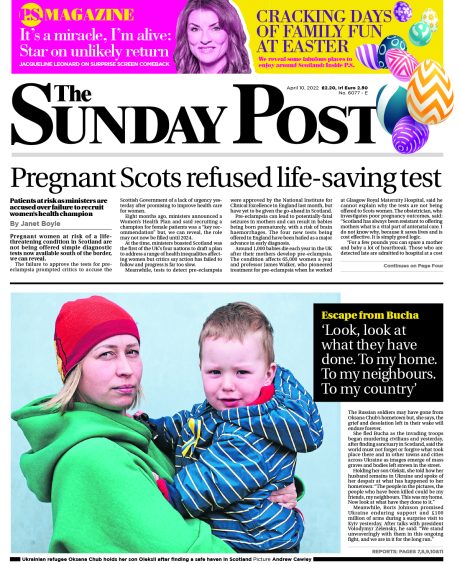
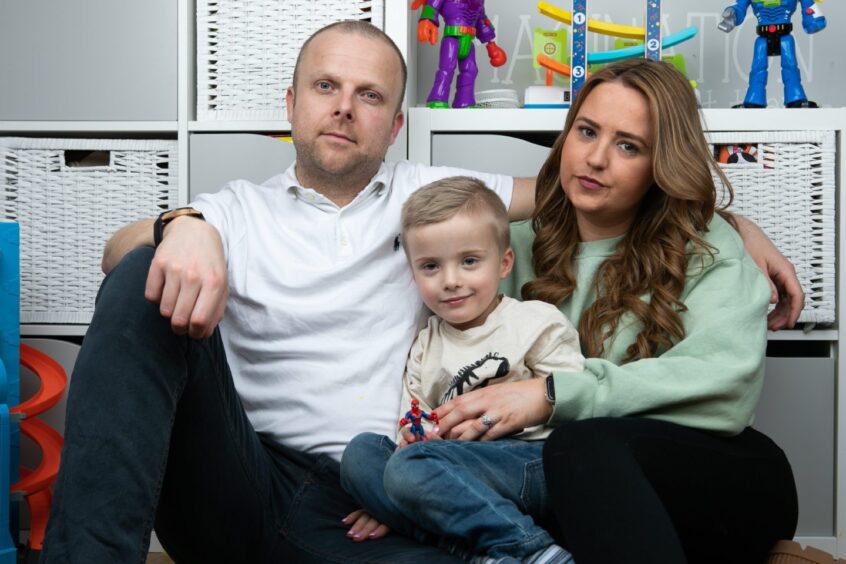 © Andrew Cawley
© Andrew Cawley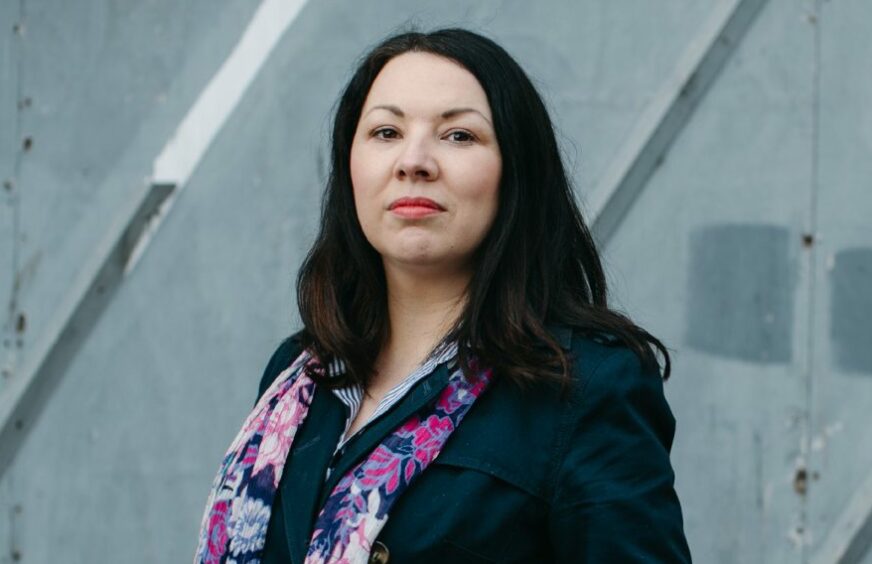 © Andrew Cawley
© Andrew Cawley